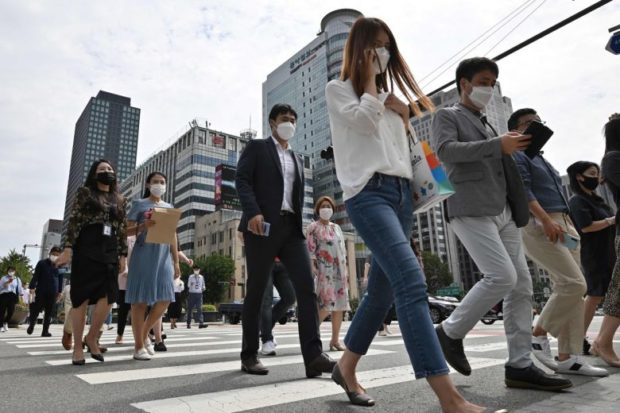World News Day: Coronavirus thrives and agonizes in fast spreading infodemic

People wearing face masks cross a road in Seoul, on Sept 11, 2020.South Korea’s early success in containing the pandemic was thwarted by a mid-August rally that led to another massive outbreak in the country. AFP via The Straits Times/Asia News Network
SINGAPORE — When they catch the Covid-19 bug in the remote interiors of Indonesia, the patients would urge the hospital authorities and nurses to come only in the middle of the night to take them away for isolation.
Such is the misinformation and stigma attached to the Covid-19 disease that those infected worry their kith and kin will suffer endlessly if neighbours learn of their ailment.
In South Korea, officials in charge of quelling Covid-19 had a harrowing time earlier this month as data showed that around 650 church members and 7,700 protesters had defied orders to be tested for coronavirus infections and more than 300 congregations breached bans on in-person gatherings.
Many were simply not convinced that the rules and regulations put in place by the government to contain the pandemic were necessary and would protect them from catching the infection.
South Korea’s early success in containing the pandemic was thwarted by a mid-August rally that led to another massive outbreak in the country, although that too has been largely brought under control now.
Article continues after this advertisementElsewhere, officials tasked with containing the pandemic are agonizing over growing anti-vaxxer and anti-mask movements in several countries. They question the efficacy of Covid-19 vaccines and support conspiracy theories. On Sept 19, 32 were arrested in London after heated clashes between the police and protesters.
Article continues after this advertisementThese and several other instances pointing to the proliferation of misinformation and disinformation surrounding the coronavirus and measures to contain the pandemic have raised alarm levels.
The World Health Organization (WHO) and the United Nations once again warned against the coronavirus “infodemic” last week in a joint statement and urged member states to develop and implement action plans to counter its spread.
WHO said that without appropriate trust and correct information, diagnostic tests will go unused, immunization campaigns or campaigns to promote effective vaccines will fail to meet targets, and the virus will continue to thrive. “The technology we rely on to keep connected and informed is enabling and amplifying an infodemic that continues to undermine the global response and jeopardizes measures to control the pandemic,” the statement said.
Separately, the apex health body has warned that the number of deaths could well hit two million before a vaccine becomes available.
Misinformation is a common problem during public health crises, research by The American Journal of Tropical Medicine and Hygiene shows. It was rampant during the recent Ebola outbreak and during the severe acute respiratory syndrome outbreak from 2002 to 2003.
While there are several consequences of the rumors, misinformation and conspiracy theories that circulate in such situations, the report points out that misinformation suggesting the “consumption of highly concentrated alcohol could disinfect the body and kill the virus” caused 800 people to die, 5,876 to be hospitalized, and 60 to go completely blind after drinking methanol.
“Rumors, stigma and conspiracy theories have the potential to decrease community trust in governments,” the authors note.
“Managing rumors, dispelling misinformation and conspiracy theories, and mitigating fear and stigma directed towards persons and places affected are essential to pandemic preparedness and control.”
Much is going on at national and global levels to contain the spread of the infodemic.
The UN launched a formal UN Communications Response initiative to combat the spread of misinformation and disinformation in April that sets guidelines for governments and international health agencies to counter disinformation.
Last week, the European Parliament set up a special committee to examine the disinformation and conspiracy theories surrounding the virus, although its remit goes beyond the pandemic as well.
The European Union will work with leading tech platforms such as Facebook, Twitter and Google to counter the infodemic. And governments are stepping up fact-checking measures.
But India, at the UN last week, warned that terrorists are disseminating misinformation to exploit the financial and emotional distress caused by lockdowns to attract the vulnerable to their fold.
Among those they are targeting to harm are health workers.
For more news about the novel coronavirus click here.
What you need to know about Coronavirus.
For more information on COVID-19, call the DOH Hotline: (02) 86517800 local 1149/1150.
The Inquirer Foundation supports our healthcare frontliners and is still accepting cash donations to be deposited at Banco de Oro (BDO) current account #007960018860 or donate through PayMaya using this link.